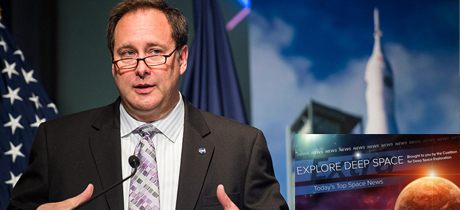In Today’s Deep Space Extra… Proposed NASA spending in 2018 should be sufficient to support a human Mars mission by 2033, according to Robert Lightfoot, the agency’s acting administrator.
Human Space Exploration
NASA chief says 2018 budget ensures Mars mission still on track for 2033
USA Today (6/8): NASA is adequately funded in 2018 to develop the systems needed to reach Mars with human explorers by 2033, including the Orion crew capsule and Space Launch System, according to the agency’s acting administrator, Robert Lightfoot. Lighfoot testified Thursday before the U.S. House Science, Space and Technology Committee. Some legislators, however, questioned the adequacy of the out years funding.
What’s next for NASA’s new astronaut class?
Space News (6/8): Twelve new NASA astronaut candidates were introduced this week at NASA’s Johnson Space Center. They will gather again in August to begin two years of “basic” astronaut training. After basic training, they will be eligible for mission assignments. Almost certainly, their destinations will include the International Space Station. Beyond that, however, they could be assigned to a future lunar orbiting outpost and eventually to the exploration of Mars.
Space Science
‘Mars 2030′ VR experience will allow users to explore terrain, drive rover, work in Station and more
Geekwire.com (6/8): Mars 2030, a new virtual reality production, will enable Earth bound humans to experience a stroll on Mars thanks to a NASA private sector agreement. The Mars VR experience from the Fusion Media Group should be available next month.
Observers track New Horizons’ next target
Sky and Telescope (6/8): NASA’s New Horizons spacecraft swept close to distant Pluto in an exploration first in July 2015. The spacecraft is on course to flyby a second Kuiper belt object, 2014 MU69, on Jan. 1, 2019. Observations with the Hubble Space Telescope are helping eliminate some of the uncertainties over the planning.
Researchers seek to bridge funding gap for private space science missions
Space News (6/8): At the opening of the Dawn of Private Space Science 2017 conference at Columbia University this week, scientists expressed an eagerness to work with the private sector to accelerate their missions. However, an access to funding is unclear.
Other News
House bill seeks to streamline oversight of commercial space activities
Space News (6/8): Introduced Wednesday, the American Space Commerce Free Enterprise Act promises to improve the regulation of U.S. commercial space activities and improve their global competitiveness. U.S. Rep. Lamar Smith, chair of the U.S. House Space Science, Space and Technology Committee, introduced the legislation earlier this week.
Could NASA and SpaceX cooperation turn into competition?
CBSNews.com (6/8): NASA is counting on SpaceX to bring cargo, and eventually astronauts to the ISS, while SpaceX relies on NASA contracts and its launch pad. SpaceX founder Elon Musk announced in February plans to use a rocket that hasn’t yet flown to take private tourists around the moon next year–an ambitious timeline, according to Mary Lynne Dittmar from the Coalition for Deep Space Exploration.
Musk: Launch of Falcon Heavy could take place as soon as September
Spaceflightinsider.com (6/8): SpaceX founder and CEO Elon Musk is narrowing the anticipated launch date for the introduction of the company’s Falcon Heavy launch vehicle. In response to a Twitter event, Musk indicates the liftoff from the Kennedy Space Center in Florida could occur in September.
China quietly appoints new space agency administrator
GB Times of Finland (6/9): Tang Dengjie, an economic engineer and formerly vice-mayor of the Shanghai municipality, will lead the China National Space Administration. Though inexperienced in the field, the new administrator will be surrounded by experts, according to the report.
China willing to cooperate with India in space, says top Chinese scientist
Hindustan Times of India (6/9): India skipped the 2017 Global Space Exploration Conference in Beijing this week. Nonetheless, cooperation in space between the two countries is possible, according to Sun Weigang, chief engineer of the China Aerospace Science and Technology Corporation.

